Diary of Trooper Ion Llewellyn Idriess-1915-1916-Part 5
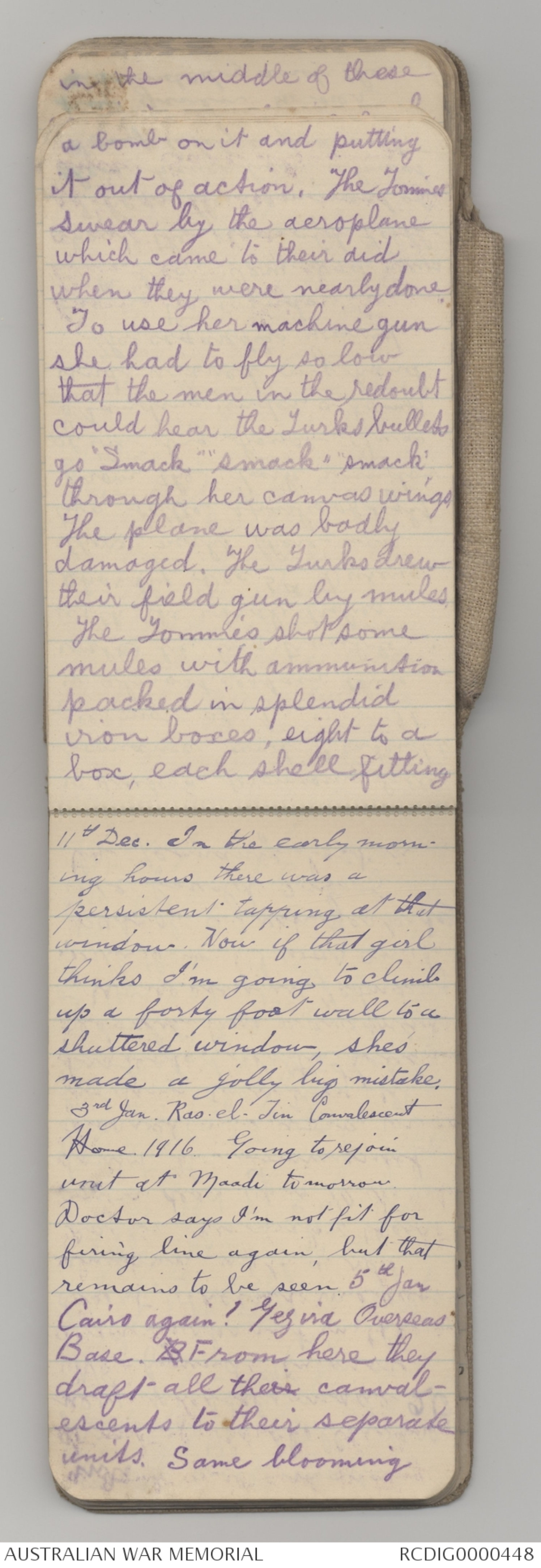
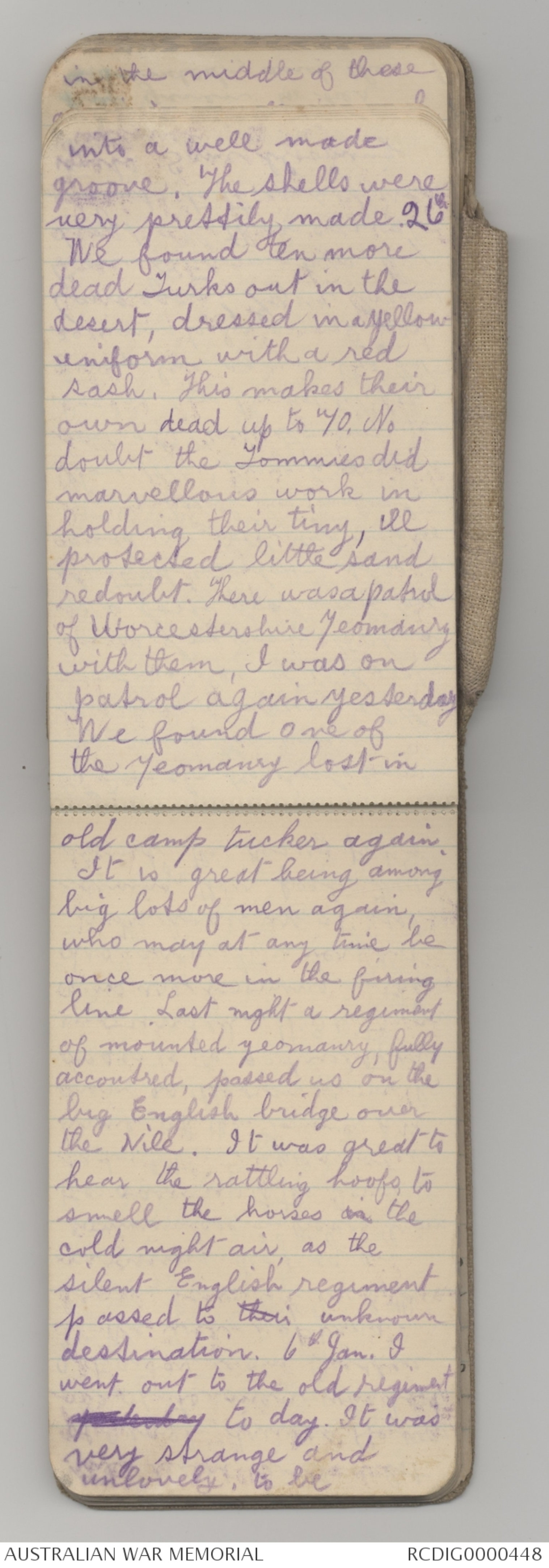
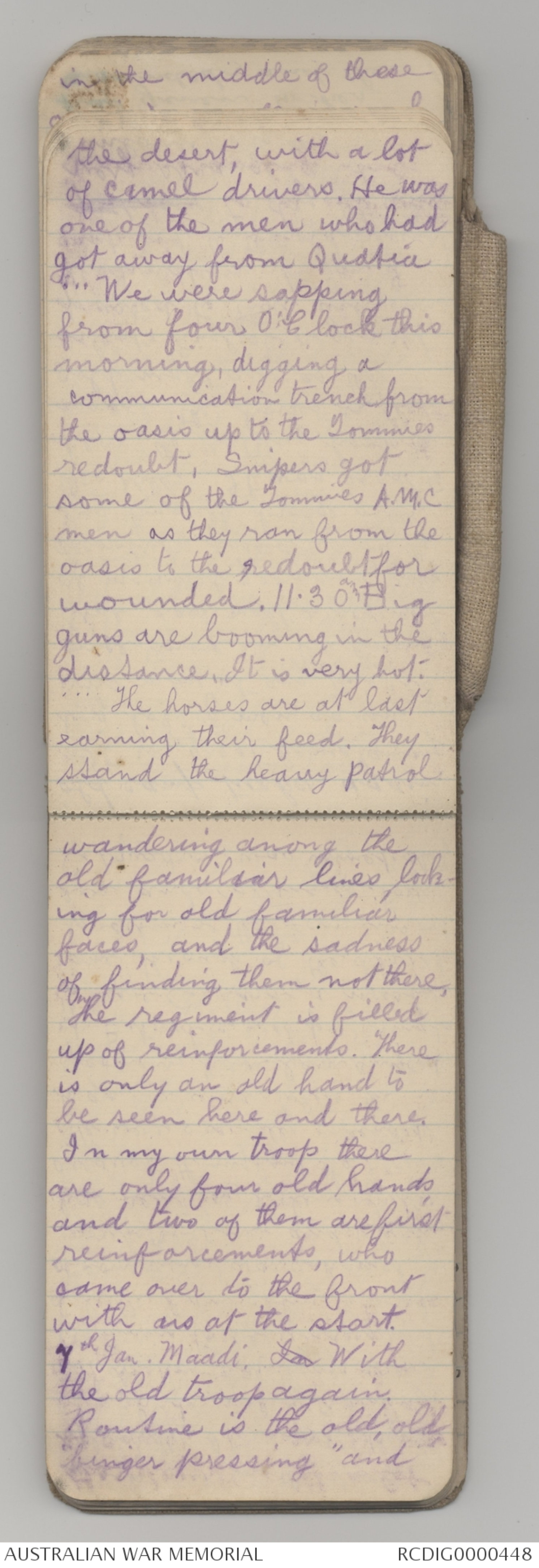
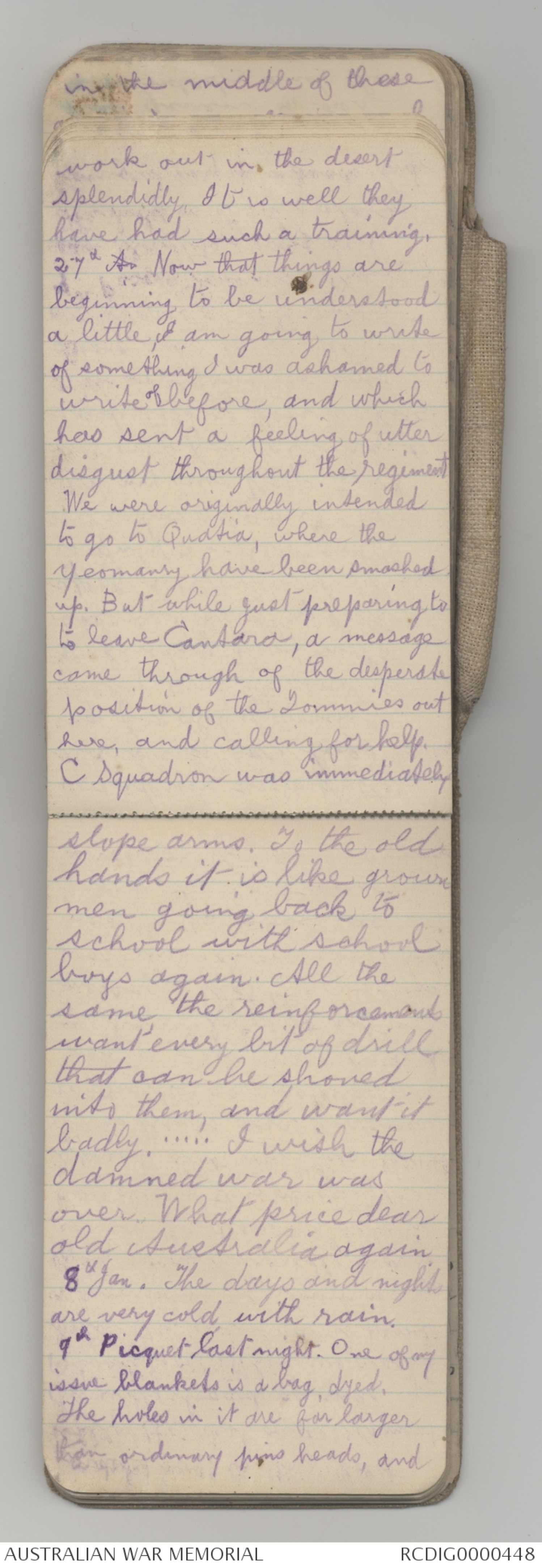
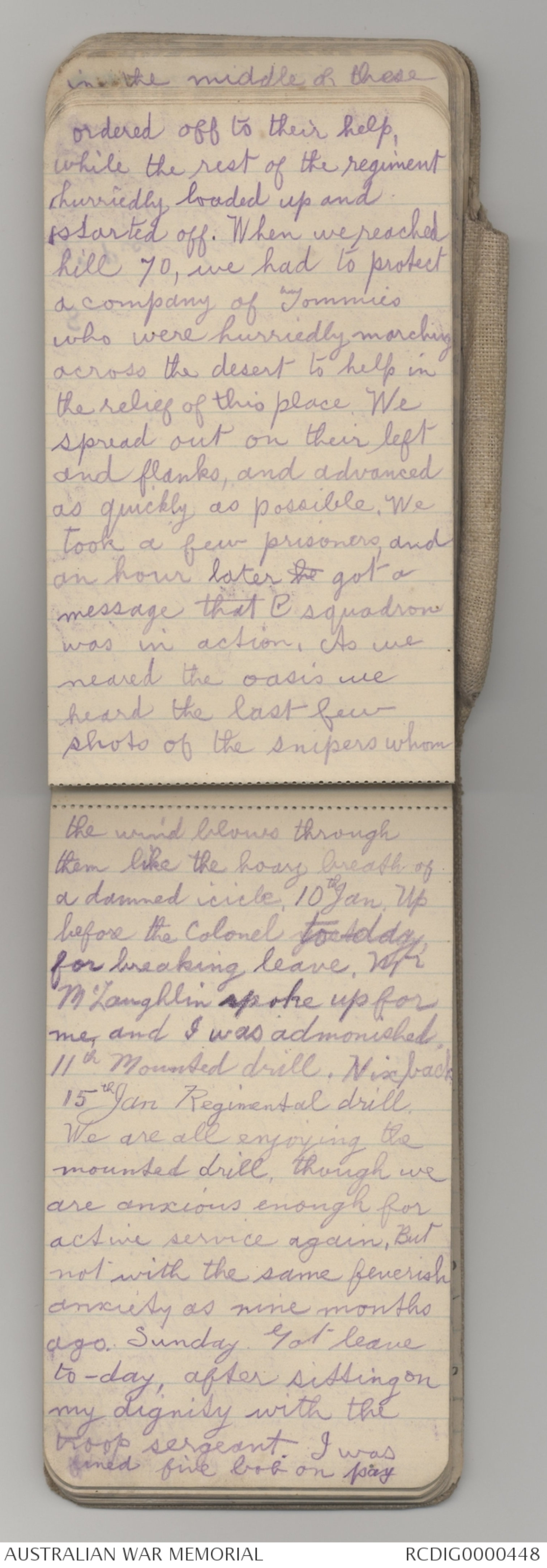
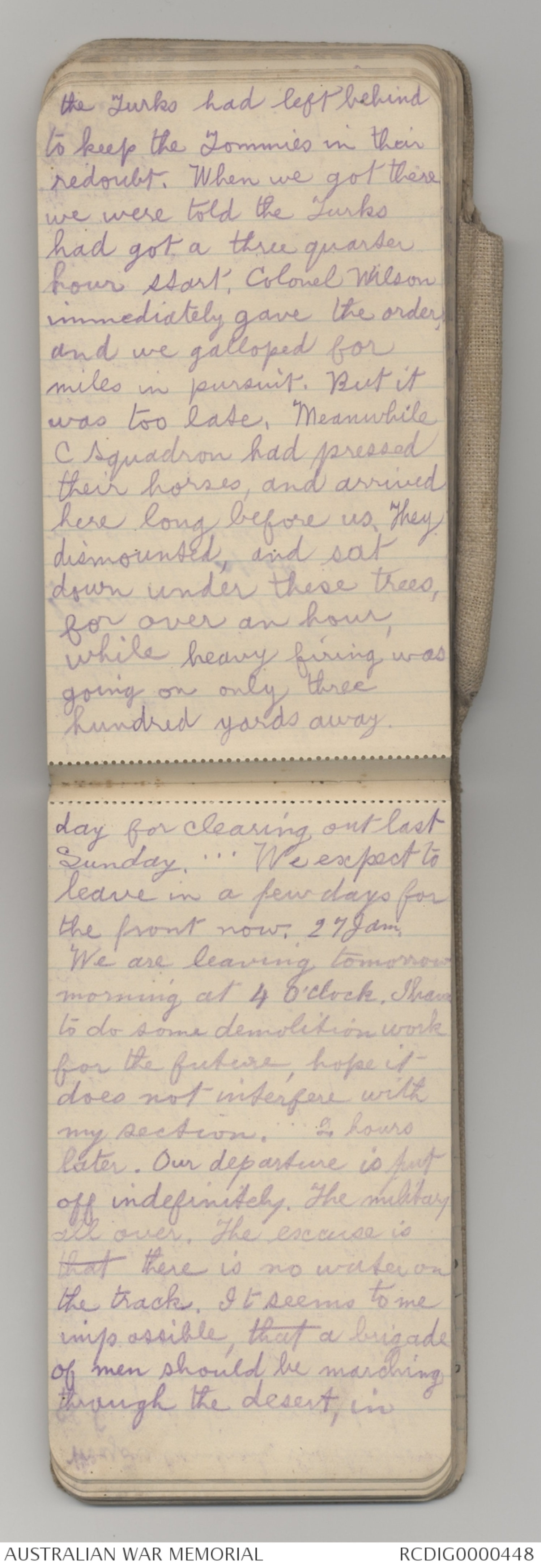
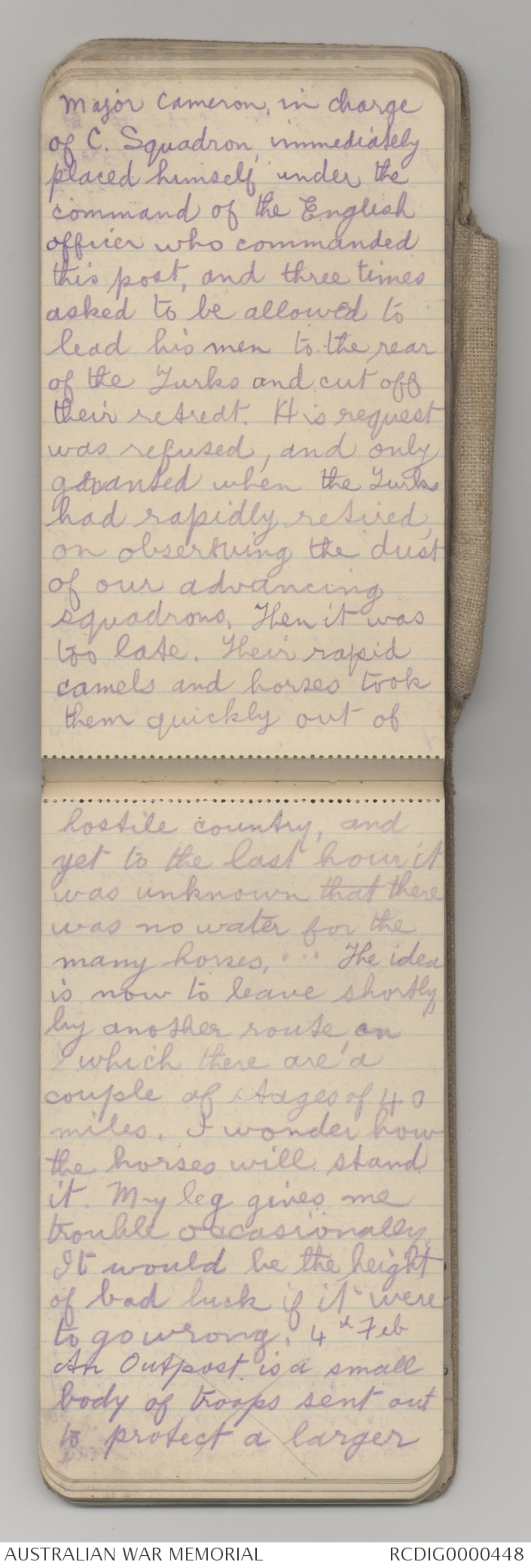
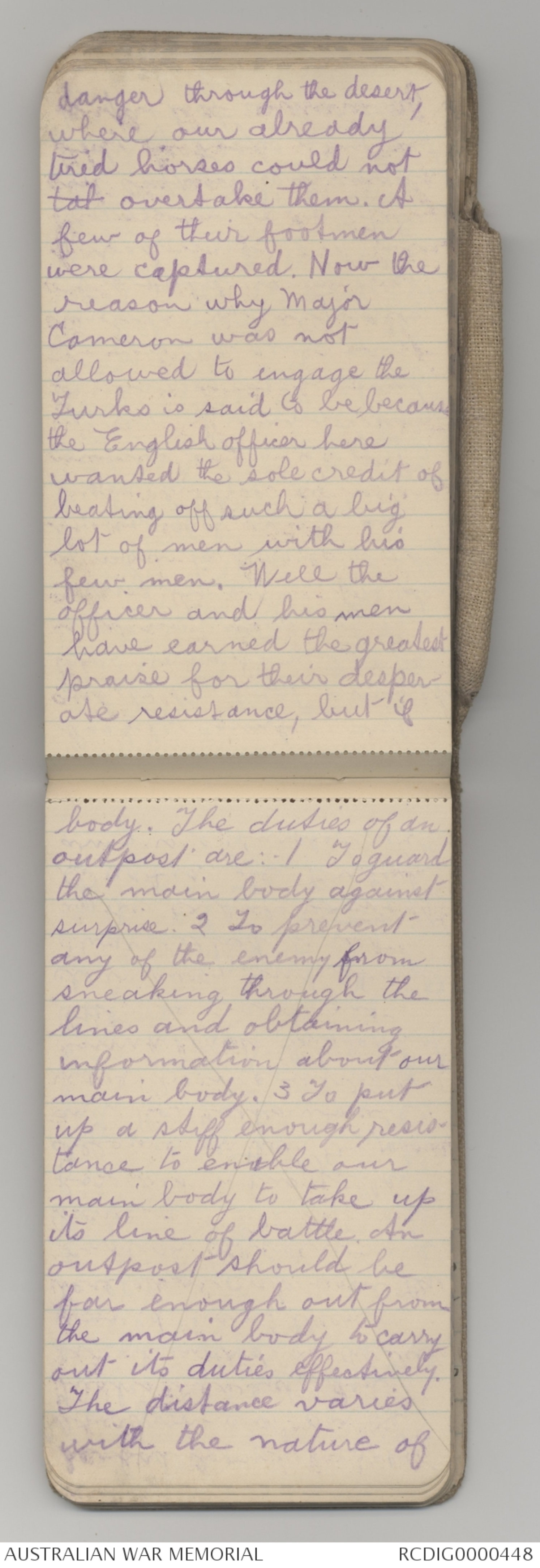
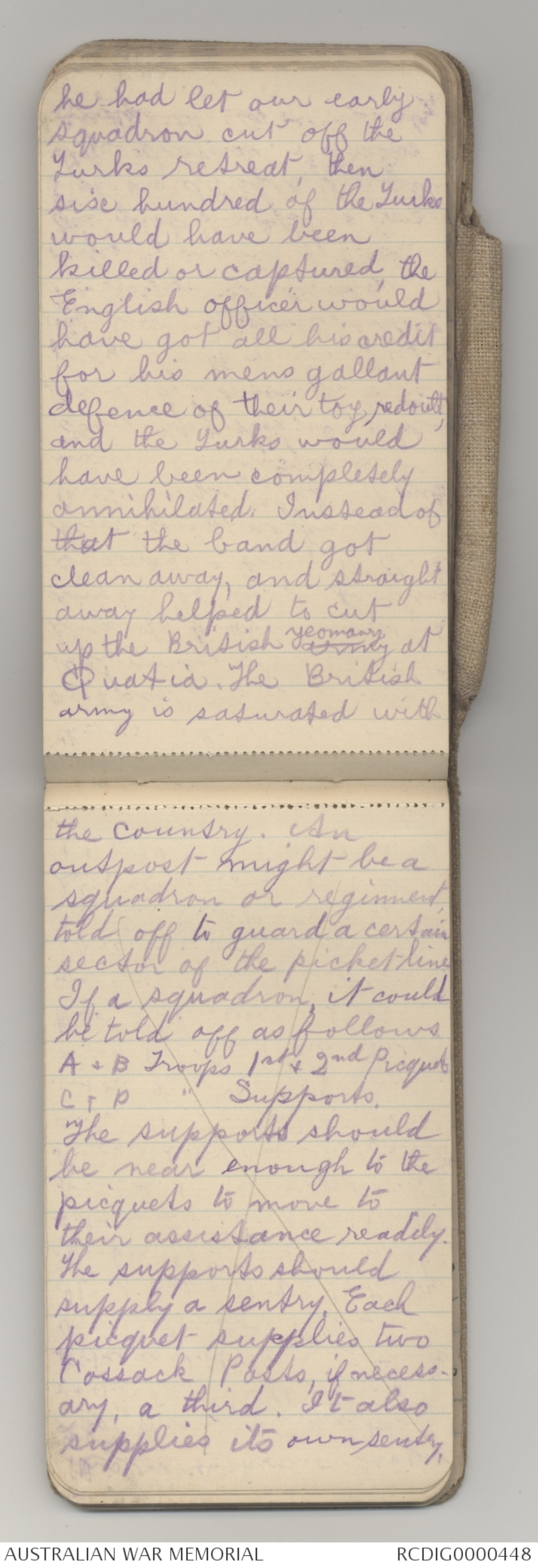
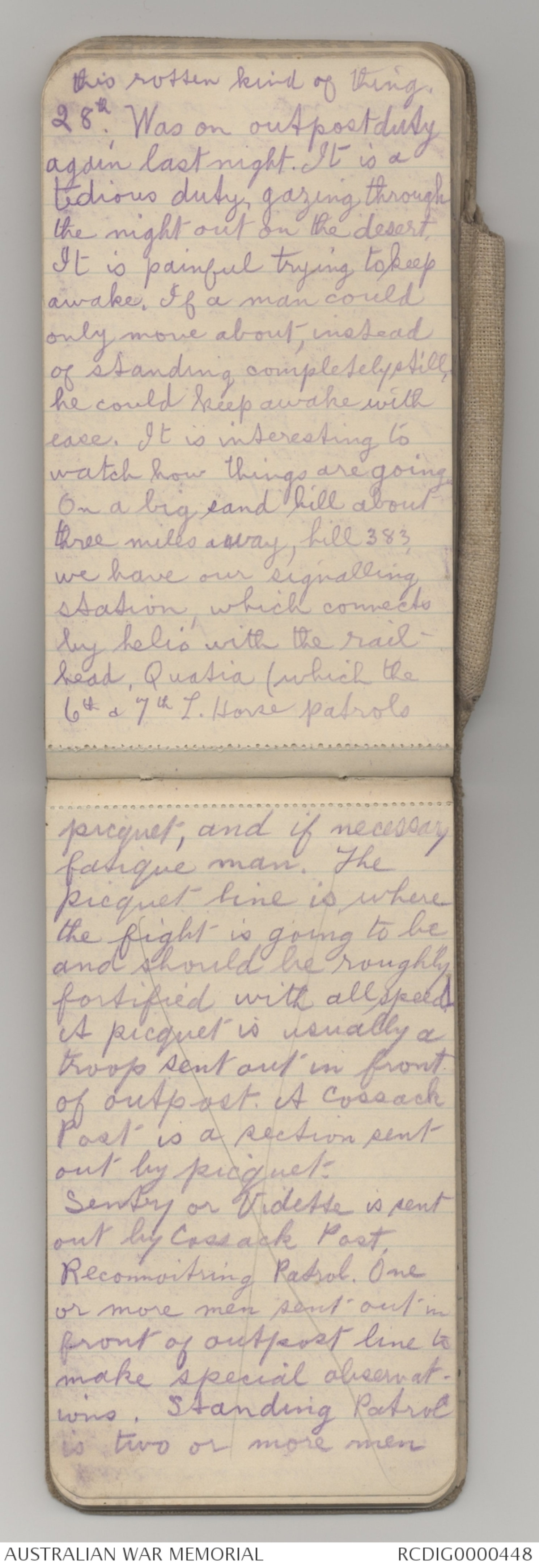
a bomb on it and putting
it out of action. The Tommies
swear by the aeroplane
which came to their aid
when they were nearly done.
To use her machine gun
she had to fly so low
that the men in the redoubt
could hear the Turks bullets
go "Smack" "smack" "smack",
through her canvas wings.
The plane was badly
damaged. The Turks drew
their field gun by mules.
The Tommies shot some
mules with ammunition
packed in splendid
iron boxes, eight to a
box, each shell fitting
into a well made
groove. The shells were
very prettily made. 26th
We found ten more
dead Turks out in the
desert, dressed in a yellow
uniform with a red
sash. This makes their
own dead up to 70. No
doubt the Tommies did
marvellous work in
holding their tiny, ill
protected little sand
redoubt. There was a patrol
of Worcestershire Yeomanry
with them, I was on
patrol again yesterday
We found one of
the Yeomanry lost in
the desert, with a lot
of camel drivers. He was
one of the men who had
got away from Quatia.
' ' ' We were sapping
from four O' Clock this
morning, digging a
communication trench from
the oasis up to the Tommies
redoubt, Snipers got
some of the Tommies A.M.C
men as they ran from the
oasis to the redoubt for
wounded. 11.30am Big
guns are booming in the
distance. It is very hot.
' ' ' The horses are at last
earning their feed. They
stand the heavy patrol
work out in the desert
splendidly. It is well they
have had such a training,
27th Ai Now that things are
beginning to be understood
a little, I am going to write
of something I was ashamed to
write of before, and which
has sent a feeling of utter
disgust throughout the regiment.
We were originally intended
to go to Quatia, where the
yeomanry have been smashed
up. But while just preparing to
to leave Cantara, a message
came through of the desperate
position of the Tommies out
here, and calling for help.
C Squadron was immediately
ordered off to their help,
while the rest of the regiment
hurriedly loaded up and
started off. When we reached
hill 70, we had to protect
a company of Tommies
who were hurriedly marching
across the desert to help in
the relief of this place. We
spread out on their left
and flanks, and advanced
as quickly as possible. We
took a few prisoners, and
an hour later he got a
message that C squadron
was in action. As we
neared the oasis we
heard the last few
shots of the snipers whom
the Turks had left behind
to keep the Tommies in their
redoubt. When we got there
we were told the Turks
had got a three quarter
hour start. Colonel Wilson
immediately gave the order
and we galloped for
miles in pursuit. But it
was too late. Meanwhile
C Squadron had pressed
their horses, and arrived
here long before us. They
dismounted, and sat
down under these trees,
for over an hour,
while heavy firing was
going on only three
hundred yards away.
Major Cameron, in charge
of C. Squadron, immediately
placed himself under the
command of the English
officer who commanded
this post, and three times
asked to be allowed to
lead his men to the rear
of the Turks and cut off
their retreat. His request
was refused, and only
granted when the Turks
had rapidly retired,
on observing the dust
of our advancing
squadrons. Then it was
too late. Their rapid
camels and horses took
them quickly out of
danger through the desert,
where our already
tired horses could not
tal overtake them. A
few of their footmen
were captured. Now the
reason why Major
Cameron was not
allowed to engage the
Turks is said to be because
the English officer here
wanted the sole credit of
beating off such a big
lot of men with his
few men. Well the
officer and his men
have earned the greatest
praise for their desperate
resistance, but if
he had let our early
squadron cut off the
Turks retreat, then
six hundred of the Turks
would have been
killed or captured, the
English officer would
have got all his credit
for his mens gallant
defence of their toy, redoubt,
and the Turks would
have been completely
annihilated. Instead of
that the band got
clean away, and straight
away helped to cut
up the British army yeomanry at
Quatia. The British
army is saturated with
this rotten kind of thing.
28th. Was on outpost duty
again last night. It is a
tedious duty, gazing through
the night out on the desert.
It is painful trying to keep
awake. If a man could
only move about, instead
of standing completely still,
he could keep awake with
ease. It is interesting to
watch how things are going.
On a big sand hill about
three miles away, hill 383,
we have our signalling
station, which connects
by helio with the railhead,
Quatia (which the
6th & 7th L. Horse patrols
11th Dec. In the early morning
hours there was a
persistent tapping at that
window. Now if that girl
thinks I'm going to climb
up a forty foot wall to a
shuttered window, she's
made a jolly big mistake.
3rd Jan. Ras-el-Jin Convalescent
Home 1916. Going to rejoin
unit at Maadi tomorrow.
Doctor says I'm not fit for
firing line again, but that
remains to be seen. 5th Jan
Cairo again! Gezira Overseas
Base. B From here they
draft all their convalescents
to their separate
units. Same blooming
old camp tucker again.
It is great being among
big lots of men again,
who may at any time be
once more in the firing
line. Last night a regiment
of mounted yeomanry, fully
accoutred, passed us on the
big English bridge over
the Nile. It was great to
hear the rattling hoofs, to
smell the horses in the
cold night air, as the
silent English regiment
passed to their unknown
destination. 6th Jan. I
went out to the old regiment
yesterday to day. It was
very strange and
unlovely, to be
wandering among the
old familiar lines, looking
for old familiar
faces, and the sadness
of finding them not there,
The regiment is filled
up of reinforcements. There
is only an old hand to
be seen here and there.
In my own troop there
are only four old hands,
and two of them are first
reinforcements, who
came over to the front
with us at the start.
7th Jan. Maadi. In With
the old troop again.
Routine is the old, old
"finger pressing" and
slope arms. To the old
hands it is like grown
men going back to
school with school
boys again. All the
same the reinforcements
want every bit of drill
that can be shoved
into them, and want it
badly. ' ' ' ' ' I wish the
damned war was
over. What price dear
old Australia again.
8th Jan. The days and nights
are very cold with rain.
9th Picquet last night. One of my
issue blankets is a bag, dyed.
The holes in it are far larger
than ordinary pins heads, and
the wind blows through
them like the hoary breath of
a damned icicle. 10th Jan. Up
before the Colonel to-day
for breaking leave. Mr
McLaughlin spoked up for
me and I was admonished.
11th Mounted drill. Nix back.
15th Jan Regimental drill.
We are all enjoying the
mounted drill, though we
are anxious enough for
active service again. But
not with the same feverish
anxiety as nine months
ago. Sunday. Got leave
to-day, after sitting on
my dignity with the
troop sergeant. I was
fined five bob on pay
day for clearing out last
Sunday. ' ' ' We expect to
leave in a few days for
the front now. 27 Jan.
We are leaving tomorrow
morning at 4 O'clock. I have
to do some demolition work
for the future, hope it
does not interfere with
my section. ' ' ' 2 hours
later. Our departure is put
off indefinitely. The military
all over. The excuse is
that there is no water on
the track. It seems to me
impossible, that a brigade
of men should be marching
through the desert, in
hostile country, and
yet to the last hour it
was unknown that there
was no water for the
many horses. ' ' ' The idea
is now to leave shortly
by another route, on
which there are a
couple of stages of 40
miles. I wonder how
the horses will stand
it. My leg gives me
trouble occasionally.
It would be the height
of bad luck if it were
to go wrong. 4th Feb
An Outpost. is a small
body of troops sent out
to protect a larger
body. The duties of an
outpost are: 1 To guard
the main body against
surprise. 2 To prevent
any of the enemy from
sneaking through the
lines and obtaining
information about our
main body. 3 To put
up a stiff enough resistance
to enable our
main body to take up
its line of battle. An
outpost should be
far enough out from
the main body to carry
out its duties effectively.
The distance varies
with the nature of
the country. An
outpost might be a
squadron or regiment
told off to guard a certain
section of the picket line.
If a squadron, it could
be told off as follows.
A & B Troops 1st & 2nd Picquet
C & D " Supports.
The supports should
be near enough to the
picquets to move to
their assistance readily.
The supports should
supply a sentry. Each
picquet supplies two
Cossack Posts, if necessary,
a third. It also
supplies its own sentry,
picquet, and if necessary
fatigue man. The
picquet line is where
the fight is going to be
and should be roughly
fortified with all speed.
A picquet is usually a
troop sent out in front
of outpost. A Cossack
Post is a section sent
out by picquet.
Sentry or Vidette is sent
out by Cossack Post.
Reconnoitring Patrol. One
or more men sent out in
front of outpost line to
make special observations.
Standing Patrol
is two or more men
 joan tornquist
joan tornquistThis transcription item is now locked to you for editing. To release the lock either Save your changes or Cancel.
This lock will be automatically released after 60 minutes of inactivity.